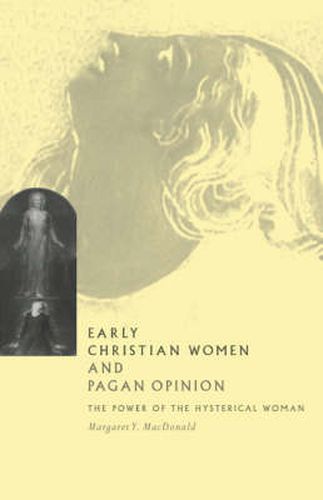Readings Newsletter
Become a Readings Member to make your shopping experience even easier.
Sign in or sign up for free!
You’re not far away from qualifying for FREE standard shipping within Australia
You’ve qualified for FREE standard shipping within Australia
The cart is loading…






This is a study of how women figured in public reaction to the church from New Testament times to Christianity’s encounter with the pagan critics of the second century CE. The reference to a hysterical woman was made by the most prolific critic of Christianity, Celsus. He was referring to a follower of Jesus - probably Mary Magdalene - who was at the centre of efforts to create and promote belief in the resurrection. MacDonald draws attention to the conviction, emerging from the works of several pagan authors, that female initiative was central to Christianity’s development; she sets out to explore the relationship between this and the common Greco-Roman belief that women were inclined towards excesses in religion. The findings of cultural anthropologists of Mediterranean societies are examined in an effort to probe the societal values that shaped public opinion and early church teaching. Concerns expressed in New Testament and early Christian texts about the respectability of women, and even generally about their behaviour, are seen in a new light when one appreciates that outsiders focused on early church women and understood their activities as a reflection of the group as a whole.
$9.00 standard shipping within Australia
FREE standard shipping within Australia for orders over $100.00
Express & International shipping calculated at checkout
This is a study of how women figured in public reaction to the church from New Testament times to Christianity’s encounter with the pagan critics of the second century CE. The reference to a hysterical woman was made by the most prolific critic of Christianity, Celsus. He was referring to a follower of Jesus - probably Mary Magdalene - who was at the centre of efforts to create and promote belief in the resurrection. MacDonald draws attention to the conviction, emerging from the works of several pagan authors, that female initiative was central to Christianity’s development; she sets out to explore the relationship between this and the common Greco-Roman belief that women were inclined towards excesses in religion. The findings of cultural anthropologists of Mediterranean societies are examined in an effort to probe the societal values that shaped public opinion and early church teaching. Concerns expressed in New Testament and early Christian texts about the respectability of women, and even generally about their behaviour, are seen in a new light when one appreciates that outsiders focused on early church women and understood their activities as a reflection of the group as a whole.